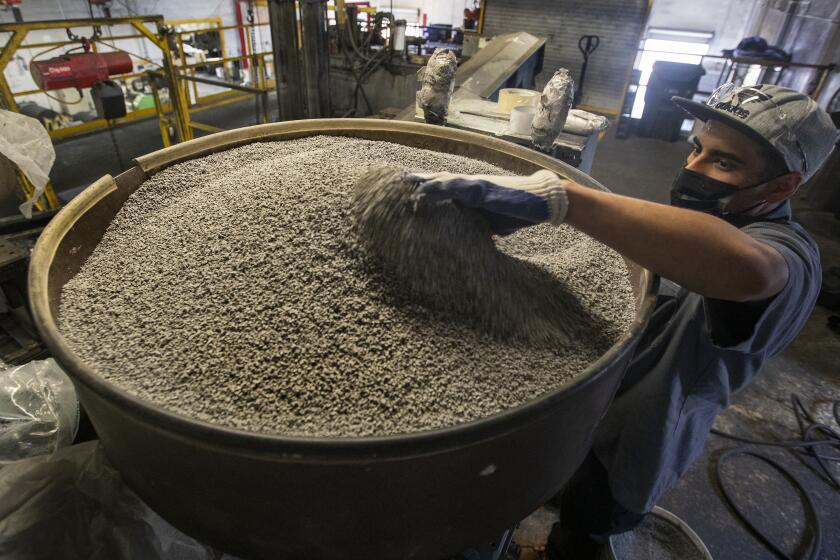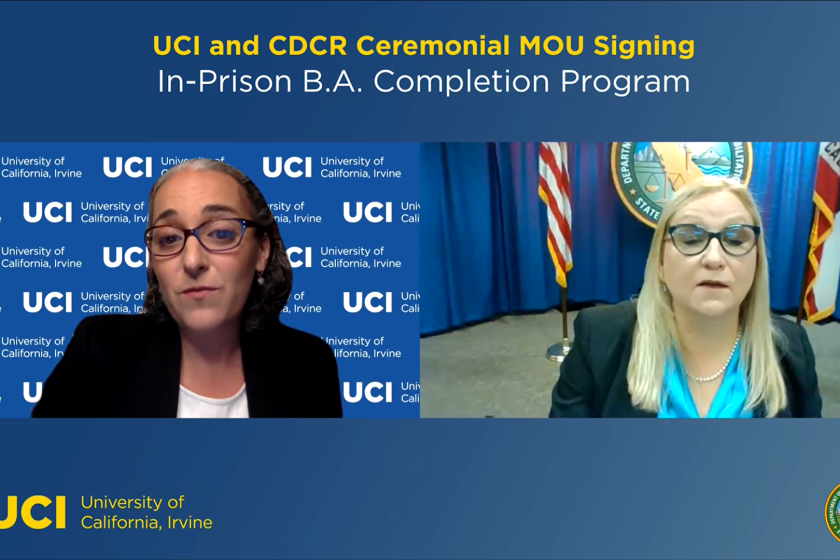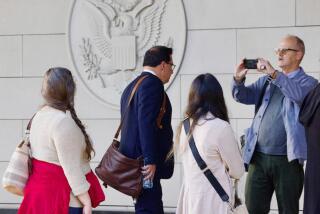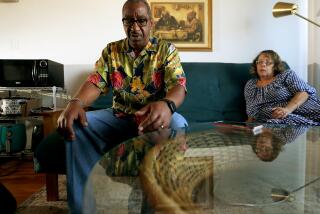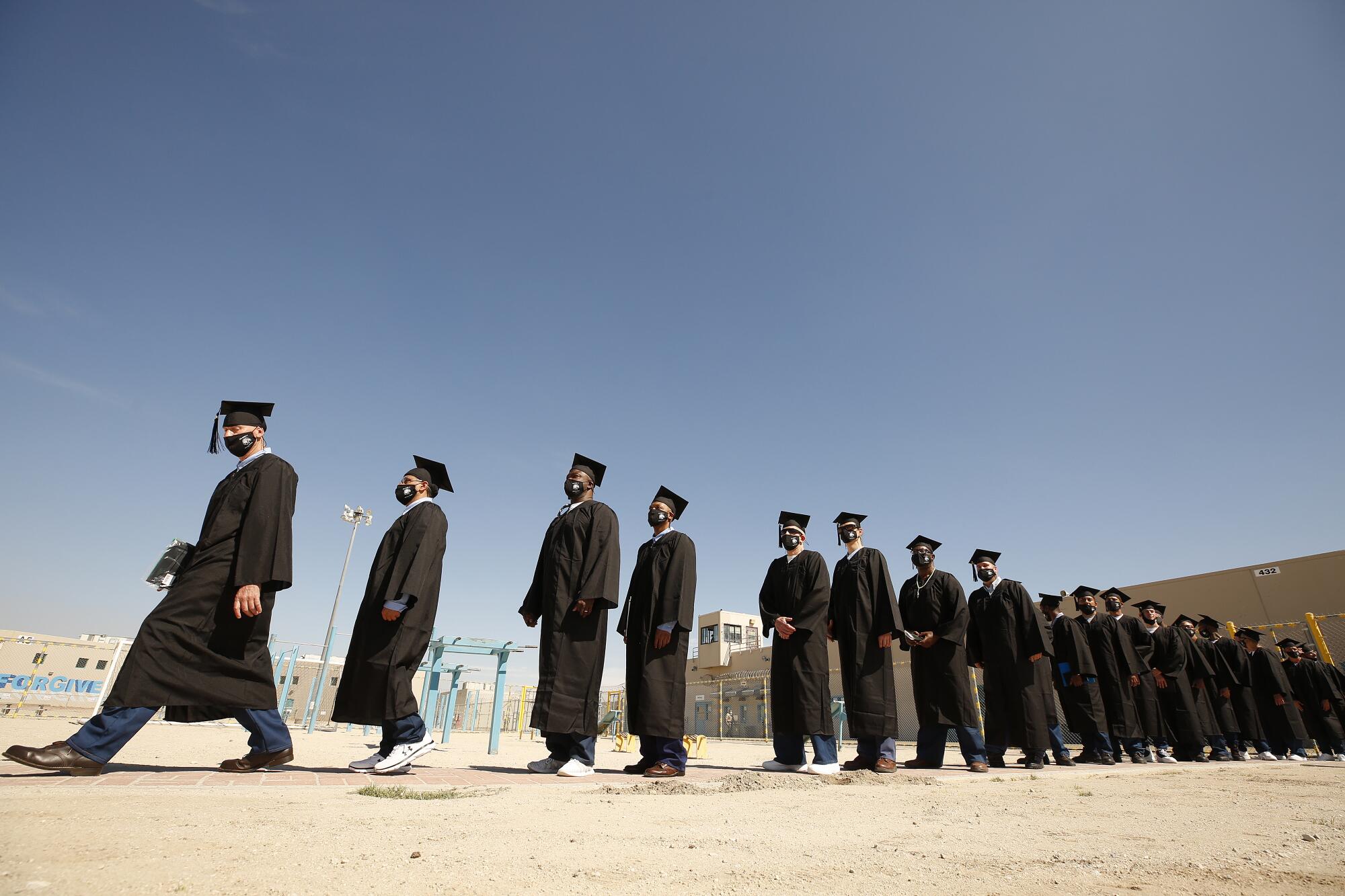
The 25 graduates marched to the middle of the prison yard. A recording of “Pomp and Circumstance” played but was drowned out by cheers.
Dozens of mothers, fathers, friends and professors sat in the blazing sun looking toward a stage set up on the basketball court, just beyond a blue mural that said “Forgive.” One woman beamed and teared up at the sight of her grandson dressed in a cap and gown.
Allen Burnett, dressed in a white button-down shirt and black pants, sat among the crowd and watched the men at California State Prison in Lancaster take their seats. Tin Nguyen entered the prison yard that day for the first time in nearly two years — a guest, not an inmate — and noticed his old gambling table was still there.
Over the summer, Burnett and Nguyen had crossed a different stage at Cal State Los Angeles; Burnett with magna cum laude honors, and Nguyen with summa cum laude status.
Most every day since, Burnett said he gets a call from prison.
Oftentimes, it’s one of his former classmates on the inside asking him about life as a college graduate beyond the barbed wire-topped walls.
::
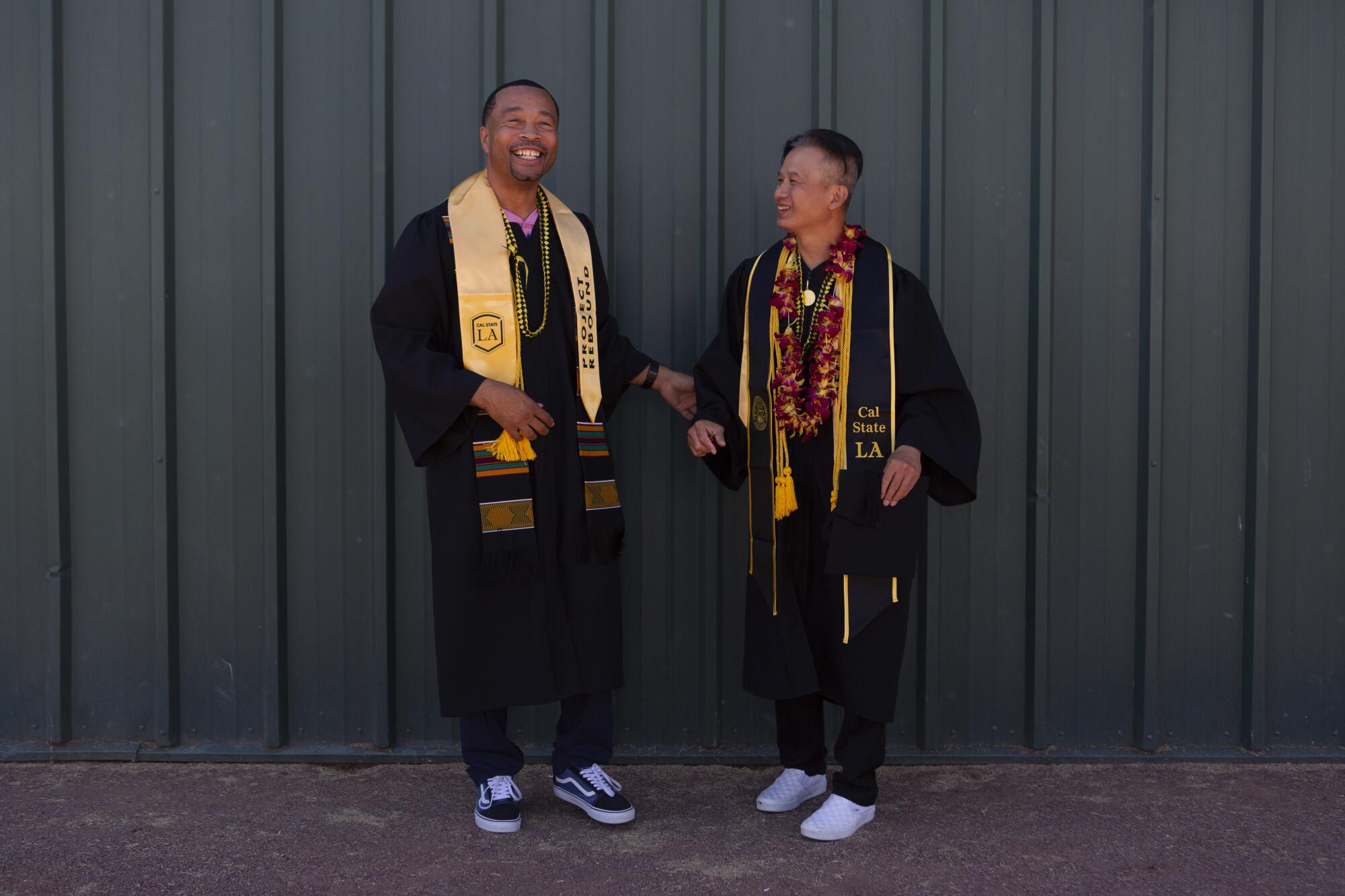
Burnett, 48, and Nguyen, 48, are among 37 freed and currently incarcerated men at the prison who were the first inmates to earn a bachelor’s degree from a California public university as part of an expanding initiative that has gained statewide attention. Launched at Cal State Los Angeles by a communications professor, the degree program imparts an otherwise unheard-of message to its students: You are worthy.
Labor shortages are prompting more companies to consider the 20 million people with convictions, but criminal background checks, job restrictions and other barriers hold back hiring.
Along with Burnett and Nguyen, 10 of the 37 graduates are now free and one more is expected to be released in March. Some of the freed men work as advocates for the incarcerated. Burnett works at Human Rights Watch’s Leadership Council, which campaigns to stop life-without-parole sentences. Many who remain imprisoned intend to find a way to work on rehabilitation programs on the inside.
On his first day out of prison after 27 years, Burnett bought shoes from a discount store, visited Target and stopped at the beach to smell the ocean air. Then he made his way to the place he had dreamed about the most while behind bars: Cal State L.A.
Burnett had been serving a life sentence for a crime he committed when he was 18, when he was involved in a fatal carjacking. His sentence was commuted after his mother encouraged him to apply for early release under Gov. Jerry Brown. He learned in 2019 that he’d get the chance to go before a parole board to make his case, and he was granted freedom in 2020.
As he puts it, he was supposed to die in prison.
He had learning challenges as a kid and didn’t believe that he was worthy of a higher education. But in prison, books and education became a respite. Burnett earned an associate degree, then in 2016 got a chance to enroll in classes from Cal State L.A.
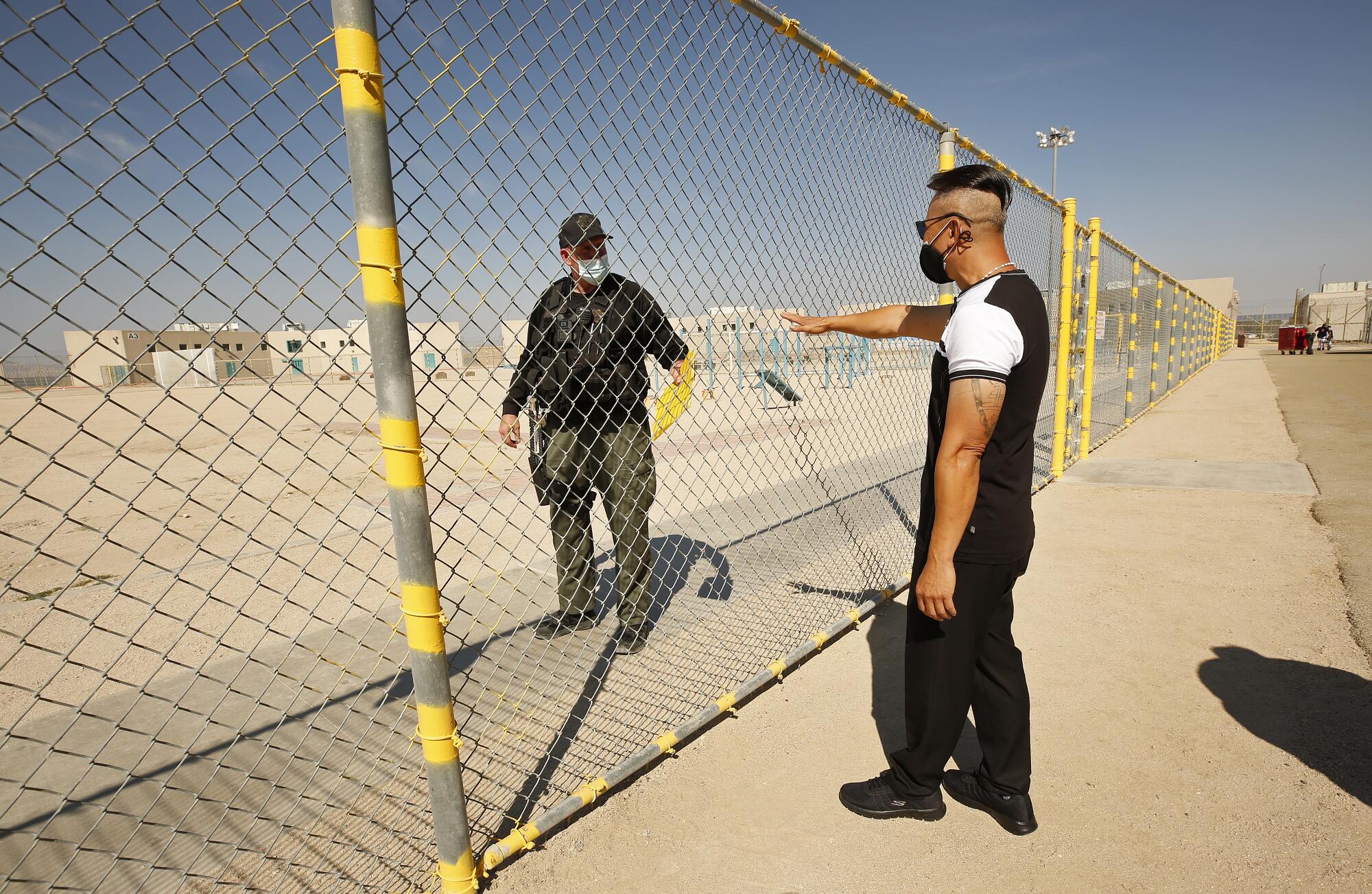
He read Henry David Thoreau’s transcendentalist writings about Walden while sitting in a cell at night. He studied Google and social media in the classroom and typed on computers without access to internet — technology he encountered only after he was released. And he met professors — people who for the first time in his life believed in his ability to transform himself.
Investing in prison education can improve the life of not just the incarcerated but society at large.
They seemed to understand that although he lives with the tremendous weight of his mistakes, his past alone — a kid who’d found his father dead from a drug overdose at the age of 5, who’d suffered abuse when he was young and got caught up in a life of crime — did not define his future.
“We were teaching the professors about life without parole and what it feels like to be isolated, to be told that you’re not worthy, that you should die in prison, because that’s what it is — death by incarceration,” Burnett said on the Cal State L.A. campus. “And then they were telling us, ‘You are worthy. You do deserve an education. You do deserve to sit in this space and have these conversations with us.’”
He now hopes that he can help change a system like the one he grew up in.
“I’m educating people who don’t really know about our criminal justice system — talking to people about how childhood trauma is trans-generational, and how we — our trauma — develops into this other thing where we can hurt other people. Like they say, hurt people hurt people. But healed people help people.”
::
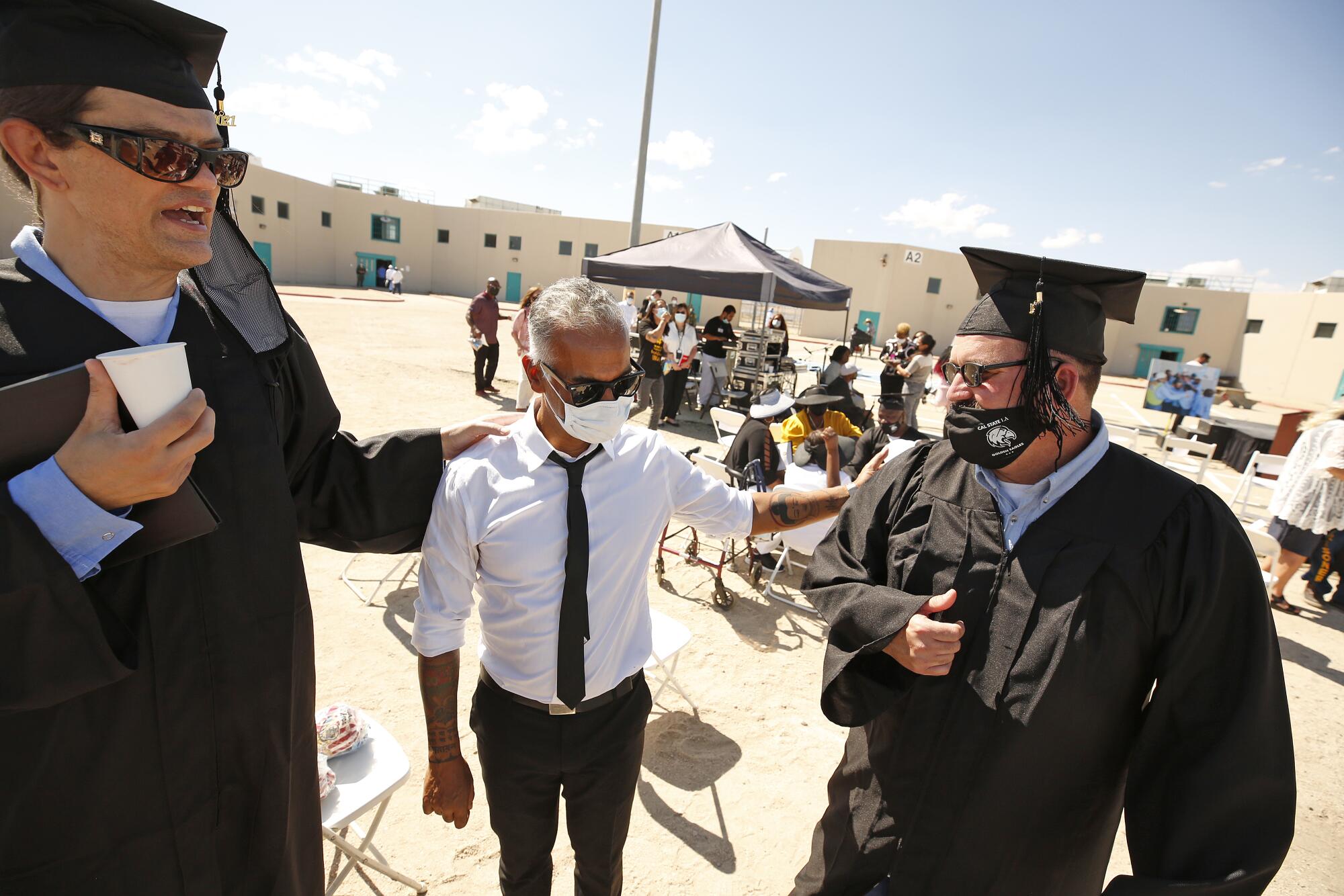
For the record:
7:38 p.m. Nov. 4, 2021A previous version of this article identified Bidhan Chandra Roy as a communications professor. He is an English professor.
It started with Bidhan Chandra Roy.
The English professor initially visited the prison while volunteering with Paws for Life, an outreach program that teaches inmates how to care for dogs. When he started teaching uncredited writing classes through Words Uncaged — a writing therapy program he founded at the prison — he was compelled to further help the men.
“When you come in here, you just see these buried, incredible people that have kind of been thrown away and forgotten. And when you sit down and speak to any of these men, you’re like, ‘Why is no one paying attention to you; why are you not getting a chance to have an education?’ And it’s a glaring kind of disjuncture for anyone, I think, with an ethical sensibility,” he said.
“I’m not justifying any actions done — but these people are not the same people anymore. And just to kind of throw lives away seems like a terrible travesty,” he said, adding that the men he’s met have enriched his own life.
Editorial: For former prisoners to have a shot at a normal life, we need successful reentry programs
Coming home after prison can be even more hazardous than being locked up. People reentering society need a comprehensive program of of public and private services
He approached Taffany Lim, executive director of Cal State L.A.’s Center for Engagement, Service and the Public Good, to launch a B.A. program in communications for men who had already earned their associate degree — or oftentimes, multiple associate degrees — while in prison.
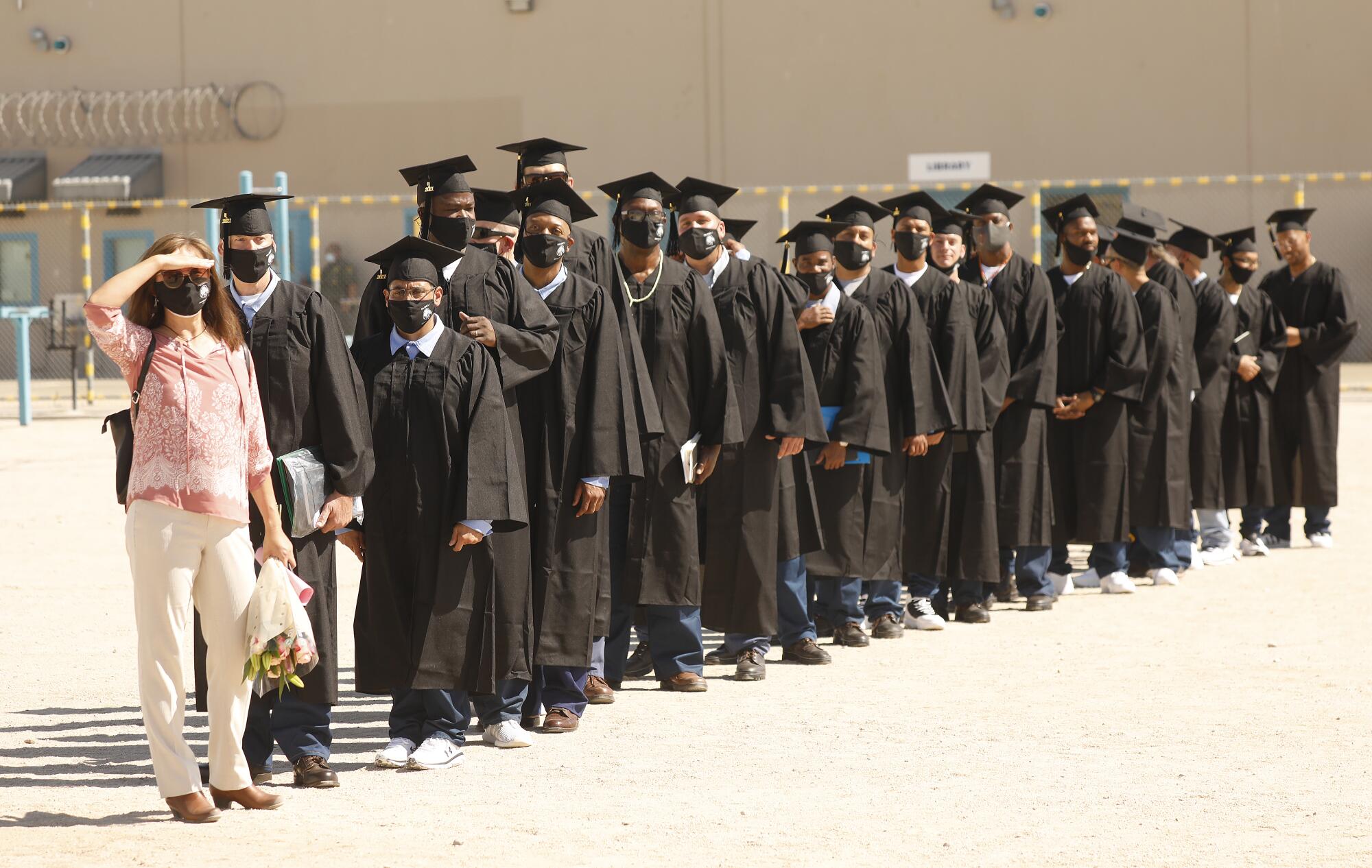
Associate degree programs in prisons were not a new concept. The ability to get a bachelor’s degree, however, had been something less common, but one that Lim believed made sense.
In 2016, after the prison initiative was approved with initial funding from the nonprofit education-focused Opportunity Institute and later from the Mellon Foundation, it was one of 67 college and university programs selected by the Obama administration to receive Second Chance Pell Grant funding for incarcerated students.
“I was behind concrete, barbed-wire razor, a gun tower. But when I walked in that class and the professor shook our hand and shut the door, I was free.”
— Tin Nguyen
The program began with 45 students. Some have since been transferred to different prisons; one died from COVID-19. In all, 37 students have graduated from the program, including 12 from the classes of 2020 and 2021 who were granted an early release after a life sentence.
“Correctional education is transformative. And any student you talk to that has succeeded in earning a trade certification or diploma — it’s life altering,” said Shannon Swain, superintendent of correction education at the California Department of Corrections and Rehabilitation.
Gov. Gavin Newsom recently signed a bill to expand higher education for incarcerated individuals. But Burnett recognizes it’s an opportunity some may not believe he deserves after preventing another person from living out their future.
“Other people will read this and they’ll think about that,” he said. Someone who has lost someone may wonder, “‘What about my son, or my daughter who was going to school, who was working and then someone just came and just took their life? What about them? Nobody’s saying anything about them.’ I’m mindful of that.”
“I think as I’ve learned as a crime survivor, it’s possible to hold two emotions,” said Tinisch Hollins, executive director of the California branch of the victims rights and the criminal reform group Alliance for Safety and Justice. The person suspected of killing her brother in 2017 is in custody awaiting trial. While she too waits, she also believes that a person doesn’t change on their own simply because they’re in prison. It takes work.
“We know the majority of people in jail or prison are going to come home,” she said. “How do we ensure our communities become safer and remain safe? I think many people would agree that education is part of that” restoration process.
::
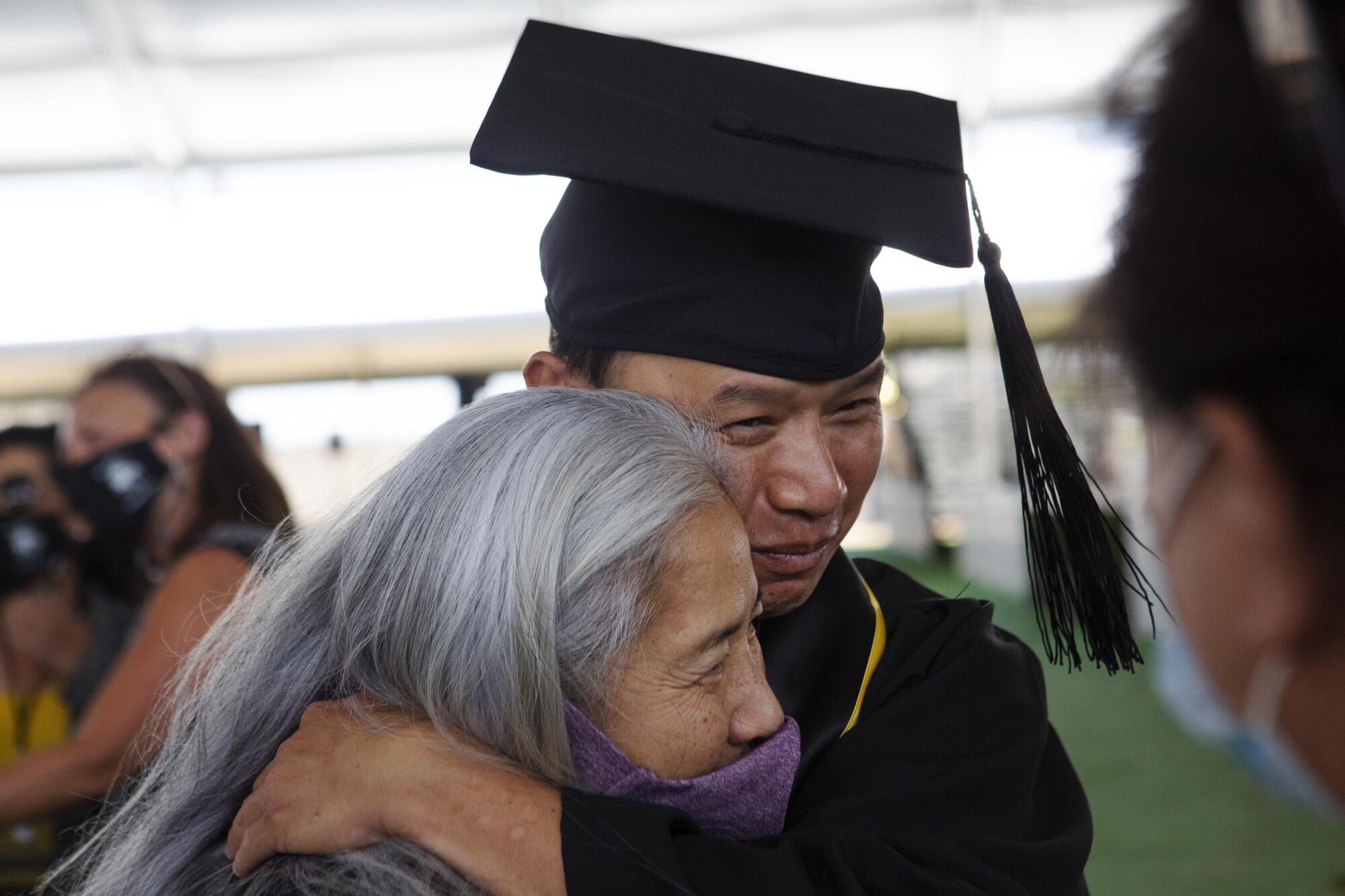
Nguyen felt as if he’d won the Super Bowl in July as confetti poured down during his graduation ceremony while his mother and sisters cheered him on.
While in prison, Nguyen started taking community college classes, which set him up with enough credits to enter the Cal State program. In class, he was no longer just an inmate or a number — he felt like an individual.
“I was behind concrete, barbed-wire razor, a gun tower. But when I walked in that class and the professor shook our hand and shut the door, I was free,” he said.
Nguyen felt like he grew up trapped between Vietnam and the United States. Fluent in neither country’s language, the Vietnamese refugee grew up believing he was dumb. He got involved with gang life at a young age, and when his friend was shot and killed in front of him as a teenager, a rage erupted.
He landed behind bars for the first time when he was 17. At 24, he was sentenced to life without parole for taking the life of a man during a robbery.
“I was sentenced to life without the possibility of parole. I served 28 years, and the last 10 years I spent on this yard enrolling and learning with these men.”
— Allen Burnett
Nguyen, like Burnett, spent two decades in California State Prison before his lifelong sentence was commuted and he was released. But he was immediately detained by Immigration and Customs Enforcement, which wanted to send him back to Vietnam. Ten months later, he was freed.
The crime that landed him in prison for the last two decades is never absent from his mind. He won’t make peace with it, he said, until he gets the chance to apologize in heaven. Until then, he’ll strive for redemption.
“If you give us an opportunity, a chance, we can change. If you give us some form of redemption, we can change,” Nguyen said. “I’m not the same man I was back then — that young, immature, impulsive, violent, dangerous, angry guy. When society allowed me to redeem myself, to give me the opportunity to change, I took it. And I think there’s a lot of guys out there in prison right now just like me.”
He is now pursuing a master’s degree in business administration.
::
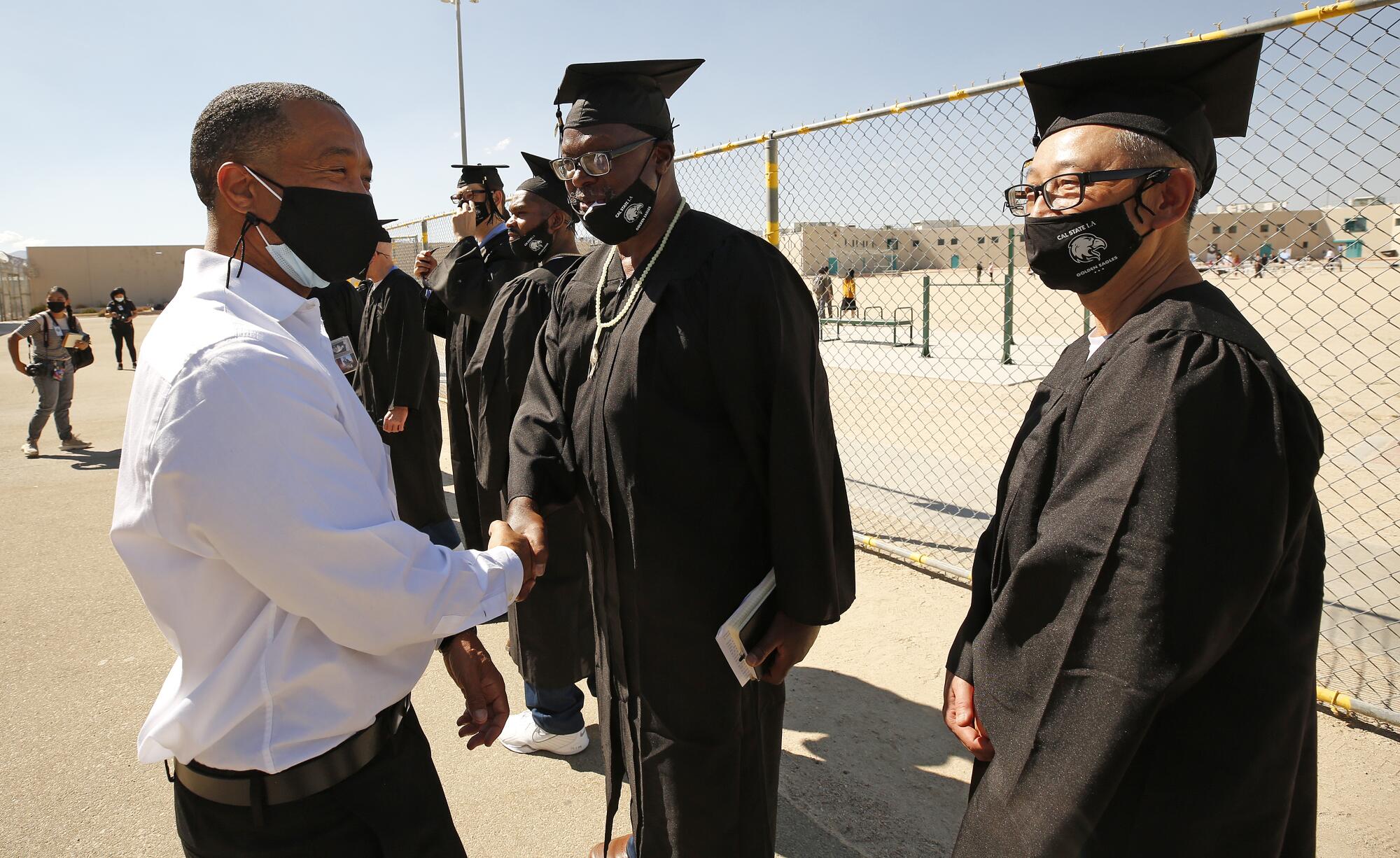
In the prison yard, the crowd shielded themselves from the sun with their commencement programs as the graduation ceremony unfolded.
A handful of students performed during the ceremony, sharing pieces in a style of group slam poetry they’d learned in a class taught by one of their communication professors, Kamran Afary.
“We are sons, fathers, husbands, humans — college grads rising above the status quo.
Forget what statistics say.
We’re communication scholars
at Cal State L.A,” one student said.
Before the names were read and the tassels turned, Burnett walked up to the stage. He addressed his professors:
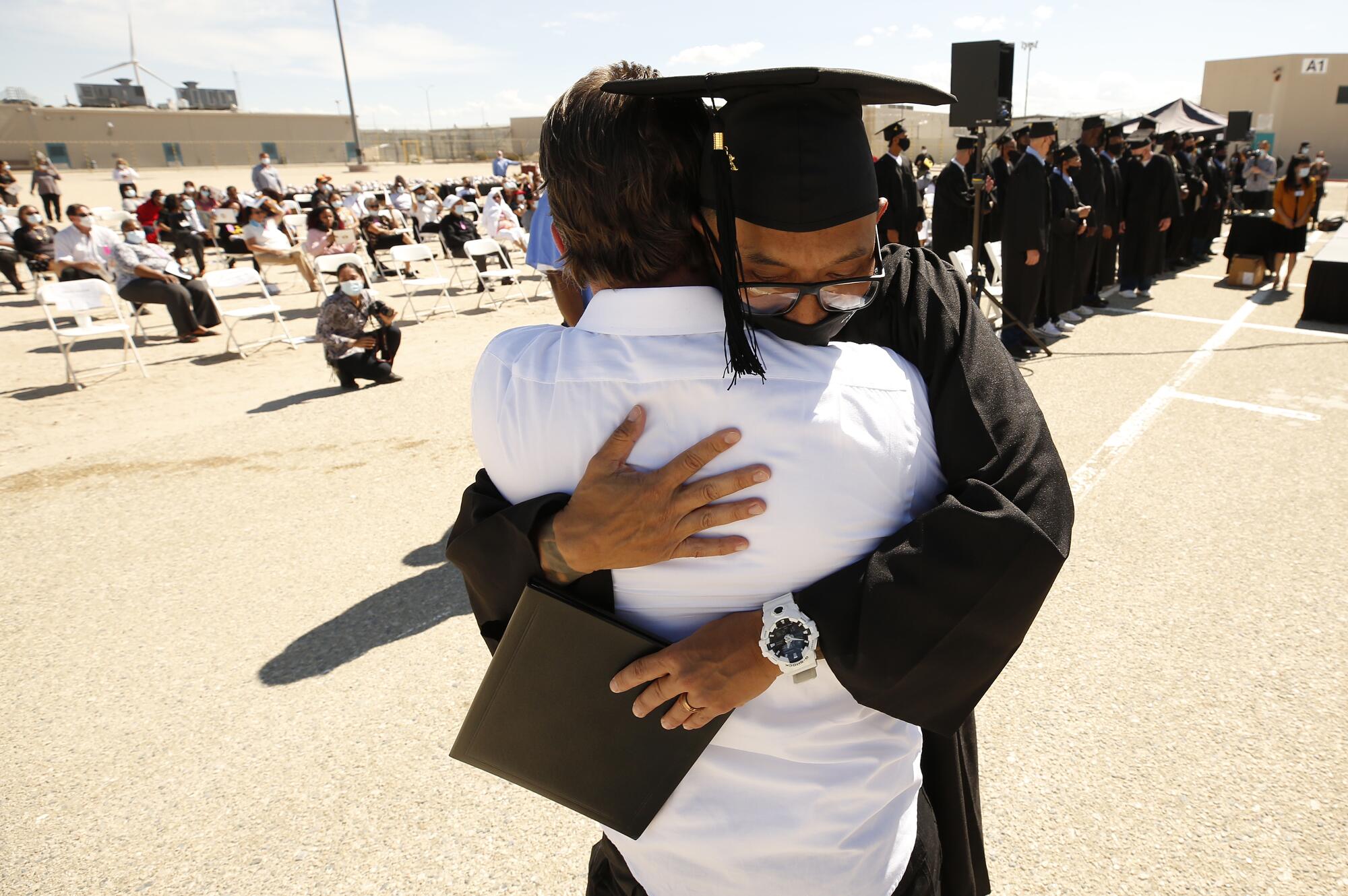
“You didn’t just come here and just have us recite a bunch of stuff and just give lectures — you added to our understanding of who we are as human beings. Through you, we were able to develop the language where we can go out and be advocates for ourselves. You allowed us to believe in ourselves, and we did. You gave us the tools, you gave us the understanding and then we taught you something too — that there’s human beings inside these prison walls.”
And he addressed his friends:
“I was sentenced to life without the possibility of parole. I served 28 years, and the last 10 years I spent on this yard enrolling and learning with these men.”
For more than a year, he’d told those inside the prison about his simple joys: tending to a garden when he’d gone years without access to plants beyond a sliver of a crack in the prison yard that let him see shades of wildflowers in the distance; sitting in traffic knowing that he was going somewhere.
Now, he shared his dreams with them for their future.
“What do I want my legacy to be? I want to see all y’all free.”
More to Read
Start your day right
Sign up for Essential California for news, features and recommendations from the L.A. Times and beyond in your inbox six days a week.
You may occasionally receive promotional content from the Los Angeles Times.
